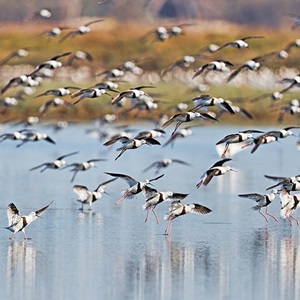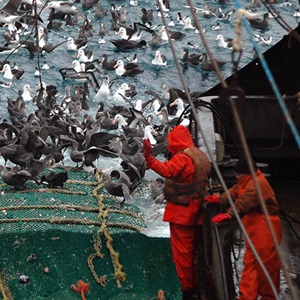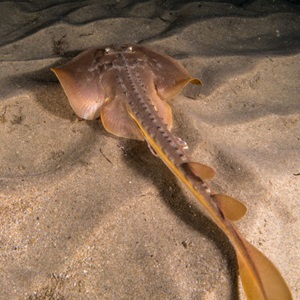Fishery managers and vessel skippers from sardine purse seine fisheries in South Australia and Cornwall, UK to share experiences of reducing marine mammal interactions.
- Visits to other fisheries to attend knowledge-sharing workshops and observe bycatch mitigation measures in practice.
- Improve understanding of marine mammal detection, deterrence and release, to support further reductions in bycatch.
Start date: April 2023
AUD $85,050
(GBP £47,933) awarded
Grant type
Science and Research
Fisheries
South Australia sardine, Cornwall sardine
Reducing risk of bycatch in purse seine nets
Marine mammals such as dolphins, seals and sealions can be unintentionally caught in purse seine nets, which encircle schools of fish. However, as this type of gear operates at the surface of the ocean, mammal bycatch is often visible and action can be taken to increase survival rates.
The South Australian and Cornish purse seine sardine fisheries operate in a similar way and have had similar interactions with marine mammals. While both fisheries have developed strategies to manage bycatch, to date there has been no opportunity to share ideas and experiences.
“Fishers possess incredible knowledge and are rarely given opportunities to share that information to the benefit of another fisher on the other side of the world.”
South Australian Sardine Industry Association
Knowledge-sharing visits
The MSC’s Ocean Stewardship Fund will enable fishery managers and vessel skippers from both sardine fisheries to visit the other and share knowledge.
The fishery representatives will participate in workshops to discuss interactions with endangered, threatened and protected species, the challenges faced and how bycatch is managed and reduced. Both fisheries have trialled different technologies, such as acoustic deterrents, and have further trials planned.
They will also share experiences with observers and monitoring systems, including the recent implementation of on-board cameras across all Cornish vessels. This is particularly timely as the Australian fishery is due to trial an on-board camera monitoring system.
Time will also be spent on a fishing trip, providing an opportunity to view management practices in action and learn from the crew.
Driving improvements to sustainability worldwide
This knowledge sharing initiative could be extended to include additional purse-seine fisheries. This includes the MSC certified Chilean jack mackerel fishery, which is also working to reduce interactions with endangered, threatened and protected species.



